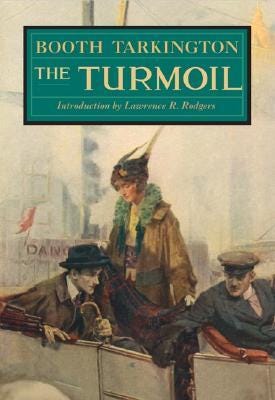Friday's Forgotten Books: The Turmoil by Booth Tarkington
When I read The Turmoil for the first time a few years ago, it was a novel that I liked moderately, but after mulling it over a good deal and reading it a second time, it has firmly ensconced itself as my second-favorite book by Booth Tarkington. Written first of what he would later group together and call his Growth trilogy, it is set chronologically after The Magnificent Ambersons, in what we're given to understand is the same nameless "midland city" (likely based on Tarkington's native city of Indianapolis), now in the full grip and roar of the industrial age. At the center of the novel is the Sheridan family, wealthy owners of a business empire worth millions. Its plot focuses around sensitive youngest son Bibbs Sheridan—the sickly one and the "odd one" of the family, who hates the noise and smoke and rush and greed of the city, and wants no part of his family's business. Family patriarch James Sheridan Sr., meanwhile, is exactly the opposite—a memorable, larger-than-life character, noisy and blunt and boisterous, who loves the noise and smoke and the continual battle to build bigger and own more as much as Bibbs hates it. Completely incapable of understanding Bibbs' feelings or his wish to be a writer instead, Sheridan is bent on molding his incomprehensible youngest into his own image, and oblivious to the cracks appearing in the foundation of his family.
Next door to the Sheridans' new mansion live the Vertrees family, the remnants of one of the city's "old families," whom Sheridan's daughter Edith and daughter-in-law Sibyl are anxious to cultivate in order to "get in with the right people" in society, something the nouveau-riche Sheridans have yet to accomplish. Unbeknownst to them, the Vertreeses' fortunes have declined and they're now living on the very edge of poverty—their only hope is for daughter Mary to charm and marry Jim Sheridan, the oldest of the clan, something she sets out to do as a deliberate sacrifice for her parents' sake. But a self-revelation on Mary's part and an unexpected catastrophe combine to put an end to this...and in the aftermath, a friendship gradually grows between Mary and Bibbs, a friendship that inspires him with the will to live and to endure the work his father has pushed him into. Yet trouble still lies ahead, as Sibyl now cherishes a grudge against Mary and intends to exact bitter revenge on her...
When I started to read The Turmoil for the first time, I thought it would be hard to take a book seriously with a protagonist named Bibbs. But after just a few chapters I had forgotten all about his name (which is explained early in the story), and by the middle of the second reading I just loved him. Tarkington demonstrated in other books his ability to create characters you want to smack upside the head, but here he proves an equal ability to create, in Bibbs Sheridan and Mary Vertrees, characters you love and whom your heart aches for, so that you long for things to turn out well for them. Even Sheridan Sr., exasperating as he is, you can never really hate; there are moments, especially toward the end, where you feel a kind of fondness for him in his bluntness and rough good intentions. All the characters, good and bad, are drawn with the same keen, understated insight that is probably what I like best about Tarkington's writing, and the story is not without its moments of joy and humor in the midst of the drama.
I think what may have left me feeling a little ambivalent on that first reading was that Tarkington doesn't seem to pull a definite conclusion out of the themes of the book—he doesn't say or give us to understand whether it's Bibbs or his father who is definitively right, or what the solution to the chaos of industrialization is. Considering this now, though, I wonder if that's because Tarkington was living and writing in the very midst of that era: maybe he honestly didn't know. He offers a suggestion of hope in Bibbs' imaginings about the future near the end, a note which rings a bit false a hundred years later, when we can see it didn't quite turn out that way. But unlike other, "greater" novelists, he does one thing definitely right: he brings his characters' story to a fitting, satisfying resolution. If there is a message of any kind in The Turmoil, the one I sensed was that it's possible to find personal fulfillment and happiness even in the midst of a chaotic society. The final scene of the book has to be one of my favorite book endings now; it's just so beautiful, and...perfect.
The Turmoil, first published in 1915, is in the public domain and available for free online. I recommend the Project Gutenberg edition, since one Amazon review says the Kindle version is missing some sections of the book in the form of journal entries. Friday's Forgotten Books is a weekly blog event hosted by Patti Abbott.





